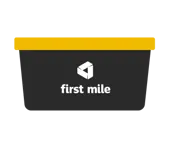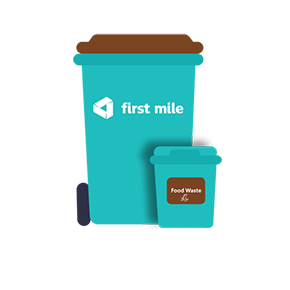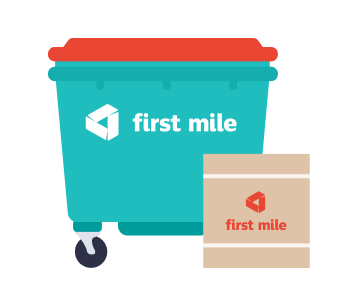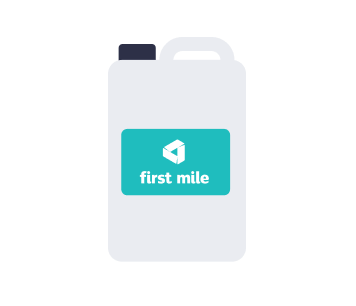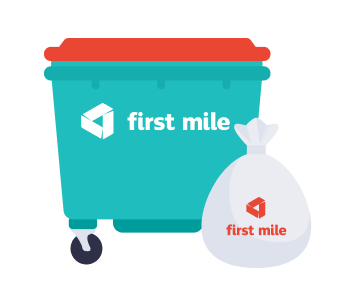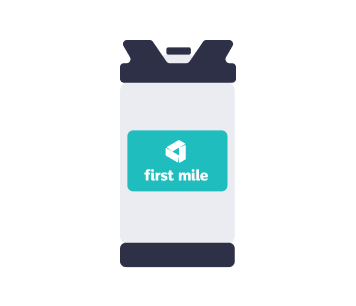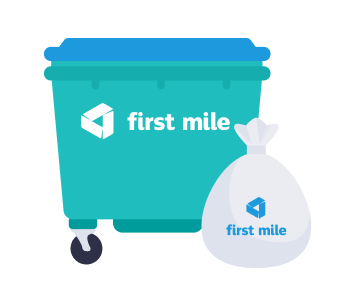Discover what service is right for you
Pay-As-You-Go Container Collections
Chuck it in
Please keep out
Recycling sharps service for Non-Clinical Sharps
Sharp objects can cause harm to humans, animals and the environment if not disposed of correctly.
As well as physical harm, sharps like knives, scissors and scalpels can take decades to decompose in landfill.
That’s why we offer a super simple recycling sharps service – so your business can dispose of its waste in a quick, safe and eco-friendly way.
Sharps Disposal service
All you need to do is steer your sharps recycling into our cheery sunshine bins with tamper-proof lids.
Our sharps disposal service says a big yes to artist scalpels, architect equipment, scissors and other non-clinical sharps.
The only no’s are medical and hazardous sharps – but if you’re not sure what you can recycle, get in touch with our friendly team.
Why set up a Non-Clinical Sharps collection with First Mile?
Sharps Disposal by First Mile
Disposing of sharp objects is by no means an easy feat.
If they end up in the wrong place, they can cause major harm to humans and animals. Plus, the metal can take decades to decompose, harming the environment.
Do you offer safe Sharps Waste disposal?
We want to ensure sharps are disposed of in a safe and environmentally friendly way, which is why we strive to make sharps recycling as painless as possible.
Simply pop your sharps into our tamper-proof bins – things such as scalpels, scissors and non-clinical sharps are what we’re looking for.
Then, our sharps waste disposal team will pick up your sharps container waste from your business and take it to our specialist storage facility.
Sharps disposal
And here’s the best part about our sharps disposal, your sharps recycling will go to an Energy from Waste facility, where the items will be safely incinerated.
The electricity generated from this process is sent to the National Grid and provides heating and hot water to local buildings. So you know that your waste is going to great use!
At First Mile, our sharps recycling service is a cut above the rest.
We offer flexible sharps waste collections up to 3 times a day, 7 days a week. That way, you can spend less time worrying about your sharps disposal and more time running your business.
Sharps Recycling FAQs
How can I get a quote?
How can I get a quote?
Enter your postcode, business and contact details to get a quote – and we’ll come back to you with a quote as soon as possible.
Do you offer rubbish removal near me?
Do you offer rubbish removal near me?
We offer rubbish removal in London and Birmingham around our major sorting plants, as well as across the country. The best way to find out if we’re in your area is to check your postcode and see if this service is available near you!
Who are Envar?
Who are Envar?
First Mile has partnered with Envar to recycle coffee grounds in the best possible way to help our environment. They specialise in composting green and food waste on a large scale, and are experts in their field, meaning they know exactly what to do with any form of coffee waste.
Why use First Mile?
Why use First Mile?
As one of the leading waste management companies in London, Birmingham and the UK, First Mile has already helped over 30,000 businesses to reduce their carbon impact with our range of recycling services - with over 200 new businesses signing up each week.
By choosing First Mile, you’ll benefit from a low cost, reliable service, a 24/7 helpdesk, and free monthly reporting. You can view our accreditations above and our certificates and insurances here.
What are cartons made of and are they recyclable?
What are cartons made of and are they recyclable?
The average carton is made up of at least three layered materials: 75% paperboard (from wood), 21% polyethylene (a type of plastic) and 4% aluminium (on long-life or aseptic packages only). It's this unique combination that makes carton packaging safe and efficient to store food and drinks, but it also means that recycling cartons require a very special process.
After collection, cartons are taken to a specialist facility where they're soaked into water to separate the paperboard fibres. These are then dried and recycled into new paper products. The recovered plastic and aluminium layers are separated and turned into garden furniture, industrial products and building materials.
The process of recycling cartons isn't the easiest, but it is possible. Still, worldwide, less than 20% of cartons packaging is recycled - we can and must do better. First Mile recycles cartons in the UK, reducing the carbon footprint necessary and ensuring that nothing ends up in a landfill.
